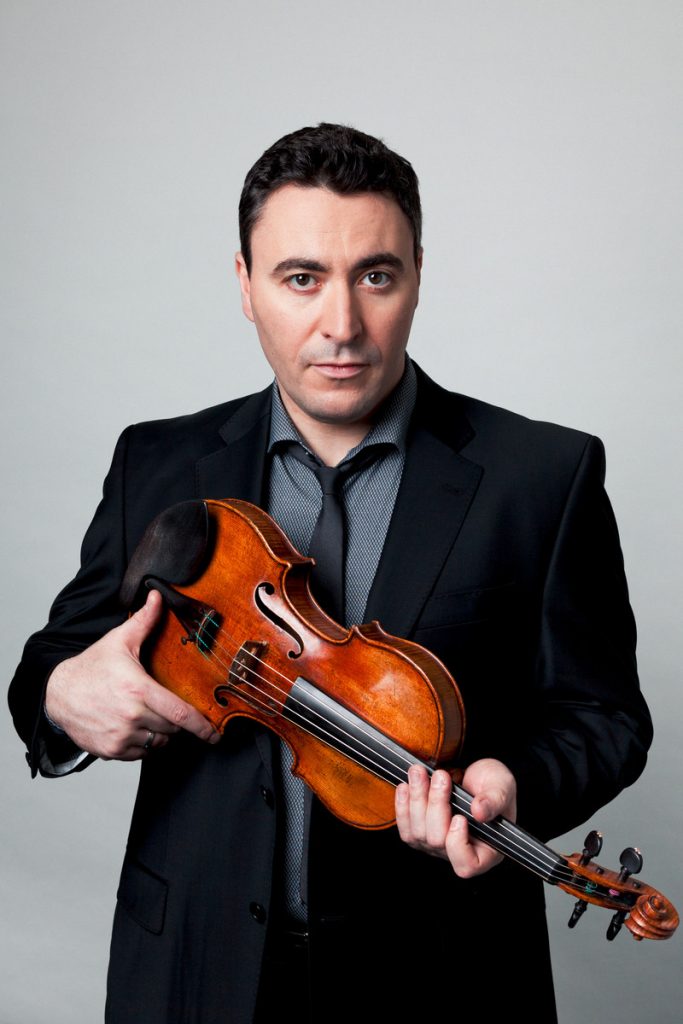Vengerov delivers belated Romantic goods in last six minutes of Carnegie recital

People had their coats on when the magic happened.
They came to Carnegie Hall Tuesday night to be enthralled by the artistry of a real old-school Romantic violinist, Maxim Vengerov. And then they waited.
They waited as Vengerov and his piano partner Polina Osetinskaya gave incoherent, unidiomatic performances of Mozart’s Sonata in B-flat major, K. 454, and Schubert’s Fantasy in C major, D. 934.
They waited through the recital’s second half, where the performance of Richard Strauss’s Sonata in E-flat major, Op. 18, had a few things going for it, and Ravel’s fiery Tzigane had more than a few.
And they waited through three chestnutty encores, a Brahms Hungarian Dance and Kreisler’s Liebesleid and Liebesfreud, all indifferently played.
By this time, many were trudging up the aisle. And then the last chestnut dropped.
After people scrambled for seats or stood in the back, the two players—but mainly Vengerov—held the room spellbound for six minutes with one of the most adagio, and achingly sustained, performances of Massenet’s “Meditation” from Thaïs one had ever heard.
As the last high note floated heavenward, and the violinist oh-so-gently lifted his bow from the string, the realization came: This was it. This was what they had bought the ticket for.
And another realization: The phrase “old school” has two meanings that are near-opposites of each other.
One has to do with the ability of a person with just a wood box and four strings to fill an enormous room with small-r romantic atmosphere, even in the year 2020, because he or she has some sort of private line to the way the greats of old used to do it.
The other refers to the self-regarding, unmusical stuff that violin recitalists used to get away with, because…see above paragraph. That includes: ill-informed interpretations of any composer whose name doesn’t end in “-sky” or “-off,” indifference to playing the music in time, and utter subjugation of the pianist, no matter what the repertoire.
As one entered Carnegie Hall Tuesday night, one couldn’t help noticing that the piano lid was propped open only a few inches. It’s likely been a while since anyone has put a piano on the short stick in this room.
The new-school title page of the printed program listed violinist Vengerov and pianist Osetinskaya in the same size type. Of the four works on the announced program, four were composed for two virtuosos, and none for one virtuoso and one accompanist. (The encores were a different story, of course.)
And yet for much of the evening Osetinskaya, an impressively proficient pianist, performed as though her name was still in fine print, playing “on top of the keys,” as pianists say, shrinking from crescendos, refusing to lead when Mozart or Schubert plainly handed her the reins. Although the pianist’s long gown made it hard to tell for sure, her hazy tone sounded as though the soft pedal (una corda) was on for much of the night.
Without that friendly challenge from an assertive partner, the violinist tended to sit back and fiddle prettily, not engaging with the pianist intellectually or sometimes even staying in sync with her.
In Strauss’s concerto-like sonata, the piano is the orchestra, and to her credit Osetinskaya stepped up to create that effect at many points. Half of Tzigane is an impassioned violin solo, but when the pianist finally did enter, she matched the blazing violinist scale for scale and sforzando for sforzando.
Vengerov’s preference for long, malleable lines with sliding portamento suited Strauss to a T. The sonata’s middle movement, titled “Improvisation,” took off in a flurry of lacy, Chopinesque piano filigree, with the violinist playing tenderly against it, closely synchronized—a fine moment.
Tzigane didn’t entirely escape sounding like a bag of violin tricks—octaves in harmonics, rapid pizzicato for right and left hands—instead of a coherent composition, but it had spirit and those “gypsy” blues.
While these late-Romantic or early-Modern pieces enjoyed some success, the duo sounded like fish out of water in the Classical pieces of the first half. They weren’t able to convey the rhythmic vivacity or the rhetorical give-and-take that make Mozart’s and Schubert’s music pop. The slow movements benefited from Vengerov’s sweet, spot-on intonation and silvery tone, but didn’t seem to take the listener anywhere.
For that trip through the heavens, the audience would have to wait. But the wait was worth it.
Carnegie Hall presents pianist Kirill Gerstein in works by Haydn, Brahms, Kurtág, Schubert, Liszt, and Adès, 7:30 p.m. Feb. 20 in Zankel Hall. carnegiehall.org; 212-247-7800.






